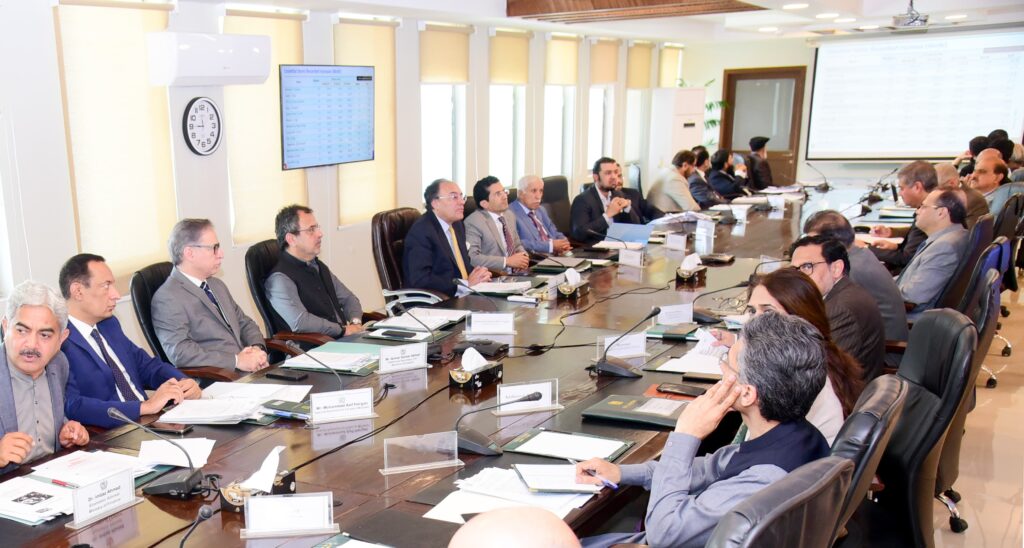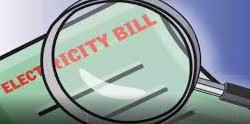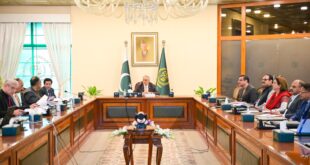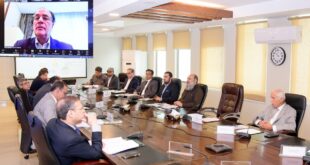
The Economic Coordination Committee (ECC) of the Cabinet, under the chairmanship of Federal Minister for Finance and Revenue Senator Muhammad Aurangzeb, convened on Thursday to approve a series of amendments to the existing net-metering regulations.
These changes aim to alleviate the growing financial burden on grid consumers, which has intensified due to the increasing number of solar net-metering users, says an official statement issued by the Finance Ministry after the meeting.
In response to the significant rise in solar net-metering consumers and its financial implications, the ECC revised the buyback rate from the National Average Power Purchase Price (NAPP) to Rs 10 per unit. Additionally, the committee endorsed a proposal, pending Cabinet ratification, granting the National Electric Power Regulatory Authority (NEPRA) the authority to periodically revise this buyback rate. This measure ensures flexibility and alignment with evolving market conditions.
It was clarified that the revised framework would not apply to existing net-metered consumers holding valid licenses, concurrence, or agreements under the NEPRA (Alternative & Renewable Energy) Distributed Generation and Net Metering Regulations, 2015. Such agreements will remain in effect until the expiration of the license or agreement, thereby safeguarding the rights and obligations of these consumers, including agreed-upon rates.
Further amendments to the settlement mechanism were also approved. Under the new structure, imported and exported units will be billed separately. Exported units will be purchased at the revised buyback rate of Rs 10 per unit, while imported units will be billed at the applicable peak/off-peak rates, inclusive of taxes and surcharges, during the monthly billing cycle. The ECC also authorized the Power Division to issue proposed guidelines—subject to Cabinet ratification—for NEPRA’s incorporation into the regulatory framework, ensuring clarity and consistency in implementation.
These decisions follow extensive deliberations on the growing impact of solar net-metering on the national power grid. The Power Division highlighted the urgent need for regulatory adjustments, citing a record decline in solar panel prices, which has significantly increased the number of solar net-metering consumers. By December 2024, these consumers had transferred a financial burden of Rs 159 billion onto grid consumers—a figure projected to surge to Rs 4,240 billion by 2034 if timely amendments are not introduced.
The ECC was informed that the number of solar net-metering consumers had risen sharply, reaching 283,000 by December 2024 from 226,440 in October 2024. Similarly, the total installed capacity had grown from 321 MW in 2021 to 4,124 MW by December 2024, underscoring the rapid expansion of the net-metering sector. However, this increase has contributed to rising electricity costs for grid consumers, counteracting the government’s efforts to reduce power tariffs.
Financial concerns were also raised regarding the increasing number of solar net-metering consumers who avoid paying the fixed charge component of the tariff, including capacity charges and fixed expenditures for power distribution and transmission. This has shifted a disproportionate financial burden onto grid consumers, exacerbating electricity tariff hikes and threatening the energy sector’s sustainability. Moreover, the ECC noted that 80% of solar net-metering consumers are concentrated in nine major cities, predominantly in affluent areas. This geographical concentration underscores the necessity for regulatory reforms to ensure fairness and balance in energy distribution.
The amendments approved by the ECC represent a crucial step toward maintaining the sustainability of the power sector while protecting the interests of all consumers, especially those dependent on the grid for electricity.
In addition to discussing energy reforms, the ECC received a detailed briefing from the Economic Advisor of the Finance Division on inflation trends in 2025. The committee was informed of a downward trajectory in the Consumer Price Index (CPI), food inflation, and the Sensitive Price Index (SPI), with a week-on-week decrease in essential commodity prices. The decline was attributed to fiscal discipline, improved supply chains, and targeted subsidies. The Chair commended these efforts and emphasized the need for continued vigilance to maintain price stability.
The ECC also reviewed a summary from the Ministry of Maritime Affairs concerning the export of Potassium Sulphate Fertiliser from Gwadar Port. The committee approved an exemption for M/s Agven Private Limited, operating in the Gwadar North Free Zone, to export up to 10,000 tons annually or 50% of actual production, whichever is lower, until December 31, 2025. This decision is intended to support the development of the Gwadar Free Zone while ensuring regulatory oversight through biannual shipment limits and data monitoring mechanisms.
Furthermore, the ECC deliberated on a summary from the Ministry of Interior and Narcotics Control regarding the disposal of gold case/reward money under the Customs Reward Rules, 2012. The committee directed the Ministry to justify the delay in processing the case and obtain a legal opinion from the Ministry of Law and Justice before resubmitting the summary.
Additionally, the ECC approved multiple Technical Supplementary Grants (TSGs) for the current fiscal year, including:
- Rs 250 million for the Ministry of Federal Education and Professional Training to support ICT-based educational initiatives, such as smart classrooms, procurement of Chrome books, technology parks, and high-impact training centers.
- Rs 220 million for the Ministry of Industries & Production to enhance SME development, focusing on bankability, subcontracting, and international consultancy engagement.
- Rs 36.099 million for the Ministry of Interior and Narcotics Control to procure spare parts for helicopter maintenance by Headquarters Pakistan Rangers (Sindh).
- Rs 15.4 million for the Ministry of Interior and Narcotics Control for helicopter maintenance by Headquarters Frontier Corps Balochistan (North), Quetta.
- Rs 670 million for the Sustainable Development Goals Achievement Programme (SAP), reallocated from the Cabinet Division to the Ministry of Interior for further distribution to the ICT Administration.
 BeNewz
BeNewz




